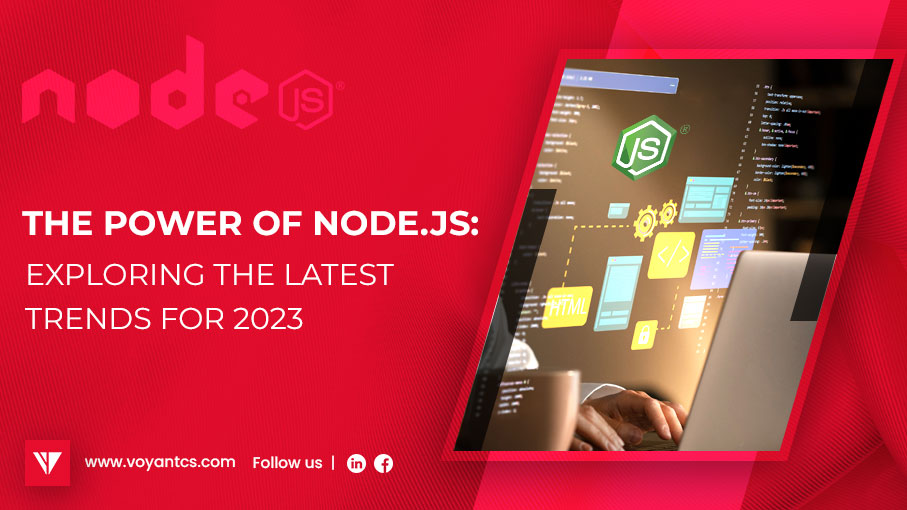- What is Node.js?
- Why Should You Choose the Node.js Framework?
- How Node.js Works
- Event-Driven Architecture:
- Single-Threaded, Non-Blocking Nature:
- V8 Engine Integration:
- NPM (Node Package Manager):
- Modules and Asynchronous Programming:
- Cross-Platform Compatibility:
- Top 5 Node.js Development Trends and Insights in 2023
Node.js has revolutionized the world of web development with its efficient and scalable server-side capabilities. As the demand for fast, real-time applications grows, Node.js has emerged as the go-to framework for developers worldwide. In this article, we will explore the key features of Node.js, its advantages, and the top trends shaping its future in 2023.
What is Node.js?
Node.js is an open-source, cross-platform JavaScript runtime environment that enables developers to execute JavaScript code outside of a web browser. It utilizes an event-driven, non-blocking I/O model, making it lightweight and efficient, perfect for building high-performance applications.
Why Should You Choose the Node.js Framework?
The Node.js framework offers several compelling advantages. Firstly, its asynchronous nature allows for handling a large number of concurrent connections with ease, making it ideal for real-time applications like chat applications and online gaming platforms. Secondly, its vast ecosystem of modules and libraries streamlines development, enabling developers to build robust applications faster. Additionally, the ability to share code between the client and server side simplifies maintenance and reduces development time.
How Node.js Works
Node.js has gained immense popularity in the web development community for its efficiency and ability to handle large-scale applications. It is a powerful runtime environment that allows developers to build server-side applications using JavaScript. Understanding how Node.js works is essential for harnessing its full potential. Let’s explore the inner workings of Node.js through the following bulleted points:
Event-Driven Architecture:
– js operates on an event-driven, non-blocking I/O model.
– It utilizes an event loop that continuously listens for events and executes associated callbacks.
– This architecture enables asynchronous execution, preventing the application from getting stuck while waiting for I/O operations.
Single-Threaded, Non-Blocking Nature:
– Unlike traditional server-side technologies, Node.js operates on a single thread.
– However, it employs non-blocking I/O operations to efficiently handle multiple requests simultaneously.
– As a result, Node.js can handle a high number of concurrent connections with ease.
V8 Engine Integration:
– js utilizes the V8 JavaScript engine, developed by Google, for executing JavaScript code.
– V8 compiles JavaScript code into machine code, making it significantly faster than traditional interpreters.
– This integration enhances Node.js’ performance and makes it a robust choice for web development.
NPM (Node Package Manager):
– NPM is a package manager that comes bundled with Node.js, allowing developers to access a vast repository of pre-built modules.
– Developers can easily install and manage external libraries using simple commands.
– NPM simplifies the development process by providing access to a wide range of useful modules and packages.
Modules and Asynchronous Programming:
– js emphasizes modular programming, where functionalities are organized into separate modules.
– Asynchronous programming is a key aspect of Node.js, enabling efficient handling of I/O operations without blocking the execution flow.
– Developers can use call-backs, promises, or async/await to manage asynchronous operations and ensure smooth execution.
Cross-Platform Compatibility:
– js is cross-platform, making it suitable for a variety of operating systems, including Windows, macOS, and Linux.
– Developers can write code once and run it on different platforms without any modifications, ensuring maximum portability.
The unique architecture and features of Node.JS, make it an excellent choice for building scalable and performant applications. By leveraging its event-driven, non-blocking nature and utilizing the V8 engine, developers can create high-performance web applications with ease. With Node Package Manager, a wide range of pre-built modules is available, streamlining the development process. Understanding how Node.js works empowers developers to harness its potential and build cutting-edge applications.
Top 5 Node.js Development Trends and Insights in 2023
- Serverless Architecture: Node.js and serverless computing go hand in hand. In 2023, serverless architecture will gain even more traction, as businesses seek cost-effective, scalable solutions that eliminate the need for managing servers.
- Microservices: Node.js is well-suited for microservices architecture, allowing developers to build and deploy smaller, modular services independently. This trend will continue to dominate in 2023, as it enhances agility and scalability.
- Internet of Things (IoT) Integration: With the growth of IoT devices, Node.js will play a crucial role in connecting and managing these devices. Its lightweight nature and event-driven architecture make it an ideal choice for IoT applications.
- Real-time Applications: In 2023, real-time applications will be in higher demand than ever. Node.js’ non-blocking I/O capabilities enable real-time data streaming, making it the preferred choice for applications requiring instant updates.
- Enhanced Security: As cyber threats continue to evolve, Node.js will focus on strengthening its security measures. Developers will leverage tools and best practices to ensure secure coding and protect applications from potential vulnerabilities.
Conclusion
In conclusion, Node.js remains at the forefront of web development in 2023, offering unparalleled speed, scalability, and performance. As businesses strive to meet the demands of modern users, adopting Node.js for their projects becomes essential. Whether it’s real-time applications, IoT integrations, or serverless architectures, Node.js proves to be the go-to framework for developers.
When considering Node.js development, partnering with a reliable and experienced Node.js Development Agency is crucial. With extensive expertise in building cutting-edge applications, Voyantt Consultancy Services (VCS) stands ready to help businesses unlock the full potential of Node.js in their projects.
